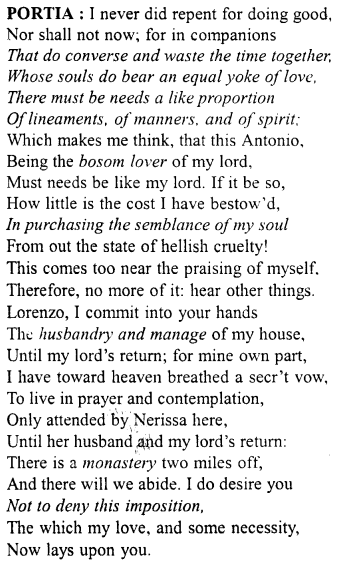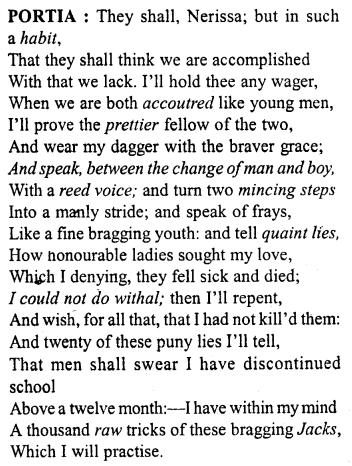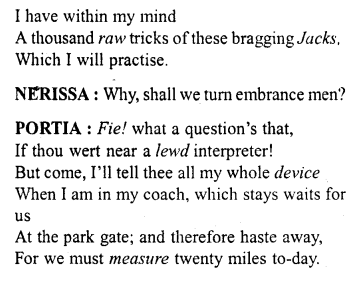Merchant Of Venice Act 3 Scene 4 Questions And Answers
ICSE SolutionsSelina ICSE SolutionsML Aggarwal Solutions
EnglishMathsPhysicsChemistryBiology
Act 3 Scene 4 Merchant Of Venice Workbook Important Questions and Answers
Passage – 1 (Act III, Sc.IV, Lines 10-34)

Paraphrase :
PORTIA : I never did regret doing good, And I won’t now; because in companions That talk and waste the time together, Whose souls bear an equal burden of love, There must be a sharing of things like proportion Of limbs, manners, and spirit, Which makes me think that this Antonio, Being the closest friend of my lord, Must be like my lord. If it’s true, How little is the cost I have paid In purchasing the image of my soul From out of the state of hellish cruelty! This sounds as if I am praising of myself; So, no more about it; listen to other things. Lorenzo, I am putting the farming And management of my house into your hands Until my lord’s return; as for me, I have taken a secret vow to heaven To live in prayer and contemplation, Only attended by Nerissa here, Until her husband and my lord’s return. There is a monastery two miles off, And we’ll stay there. I don’t want you To deny this imposition, Which my love and some necessity Now lays on you.
Word Meaning With Annotation
That do converse and waste the time together : who live and pass their time together, whose souls do bear an equal yoke of love : whose sources are united in a common bond of love. The “yoke” is a common enough sight in India, and may be described as the cross piece of wood against which a bullock pushes when pulling a cart hence Antonio and Bassanio are like two bullocks yoked to the same cart, there must be needs a like proportion, Of lineaments, of manners, and of spirit : there must be a similarity between them in countenance, in manners and in disposition, bosom Lover : dear friend, in purchasing the semblance of my soul : in saving by my money one who is the very double of Bassanio, my soul’s love, husbandry and manage : administration and management, monastery : religious house; a nunnery or convent, not to deny this imposition : not to refuse this task I place upon you.
Read the above passage and answer the following questions
Question 1.
What does Portia say of her past actions?
Answer:
Portia says that she has never repented of doing a good action in the past.
Question 2.
What is her opinion about those friends who spend their time together?
Answer:
Portia thinks that such friends must have similar characterstics of conduct, manner and temperament.
Question 3.
Why does not Portia want to continue the talk about the resemblance between Bassanio and Antonio any more?
Answer:
Portia feels that this kind of talk amounts to self-praise. So she does not want to continue it.
Question 4.
What does she want to do until the return of Gratiano and Bassanio?
Answer:
Portia and Nerissa have pledged to live alone until the return of their husbands. They will spend their time in prayer.
Question 5.
Where will Nerissa and Portia live in the meantime?
Answer:
They will stay in a monastery.
Passage – 2 (Act III, Sc. IV, Lines 60-79)

Paraphrase :
PORTIA : They shall, Nerissa; but in such a costume That they’ll think we are finished With that we don’t have. I’ll bet you any amount, When we are both dressed like young men, I’ll prove the prettier fellow of the two, And wear my dagger with the braver grace, And speak with a reed voice, That’s between the change of man and boy; And turn two delicate steps Into a manly stride; and speak about fights Like a fine bragging youth; and tell quaint lies, How honorable ladies have looked for my love, Who fell sick and died when I told them, “No”; I couldn’t do everything. Then I’ll be sorry, And wish that, for all of that, I had not killed them. And I’ll tell twenty of these flimsy lies so well, That men shall swear I have been out of school About a year. I have thousand raw tricks for These bragging Jacks within my mind, Which I’ll practice.
Word Meaning With Annotation
Habit : dress. In the same sense we still speak of a lady’s “riding-habit.” accoutred : equipped, prettier : which is now only applied to feminine beauty, was formerly used in this manner to denote manly qualities, and speak, between the change of man and boy : She is speaking of the period when a change comes in a boy’s shrill voice, but it has not yet become the deep voice of a man. reed voice : a thin sharp voice, mincing steps : the short quick steps that ladies take when walking, quaint lies : “fanciful lies.” I could not do withal : “l could not help it.” raw : childish. Jacks : fellows; young men.
Read the above passage and answer the following questions
Question 1.
What sort of habit will they have?
Answer:
They will wear male dress. But being women, they will not have manly qualities.
Question 2.
How will Portia try to look more manly?
Answer:
Portia will wear her dagger in a more suitable and dashing manner. She will speak in a sharp voice suiting a lad who is growing from boyhood into manhood. She will take one long step like a man instead of two short steps like a woman.
Question 3.
What kind of lies will Portia tell?
Answer:
She will tell skilful lies. She will tell people how respectable ladies who thought him to be a youngman wanted to fall in love with her but She (now he) rejected their advances.
Question 4.
What other tricks does Portia intend practicing?
Answer:
Portia will practise a thousand crude tricks.
Question 5.
What do you understand by “Raw tricks of bragging Jacks?”
Answer:
They are boyish tricks practised by boastful boys.
Paggage – 3 (Act III, Sc.IV (76-85)

Paraphrase :
I have thousand raw tricks for These bragging Jacks within my mind, Which I’ll practice.
NERISSA : Why, shall we turn into men?
PORTIA : Nonsense, what kind of a question is that, If you were near a nasty interpreter! But come, I’ll tell you all about my whole plan When I am in my coach, which waits for us At the park gate; and so hurry, Because we must travel twenty miles today.
Ward Meaning With Annotation
Raw : childish. Jacks : fellows; young men. fie : shame on you. lewd : indecent sensual, device : entire plan, measure : travel distance of
Read the above passage and answer the following questions
Question 1.
Who are referred to as ‘bragging jacks’? In what favourable condition will the speaker be to practise tricks” on these bragging Jacks?
Answer:
Portia refers to those boastful young men who often talk of their imaginary adventures in love and war. They are referred to as ‘bragging Jacks’.
Portia will be disguised as a young man. So will be her maid Nerissa. But Portia is confident that she will look smarter. She will be able to play the role of those bragging Jacks with perfection.
Question 2.
Briefly state any three of the Portia’s tricks referred to just before this extract.
Answer:
Portia will wear her dagger in a gallant way. She will speak in a voice that is between a young boy’s and a man’s, which will be a shrill voice. She will tell strange lies about how honourable ladies tried to win his (being dressed as young man) love, but fell sick and died when he refused to reciprocate.
This description of how Portia will behave disguised as a young man, besides revealing her own ingenuity and wit, gives a satirical picture of the typical young gentleman of the period, who was fond of duelling, boasting, of love and leading a fashionable, roving life.
Question 3.
What has Portia told Lorenzo about her plans before her departure?
Answer:
Portia discloses her plan to leave her house along with Nerissa. She has taken a vow to pass her time in prayer and meditation until the return of her husband. Nerissa will be with her, waiting in the same manner for her husband. There is a monastery two miles away, and they will stay there.
Portia hands over the charge of her house and servants to Lorenzo and Jessica. In her absence, they will manage the house. The servants too have been given all instructions, and they will treat Lorenzo and Jessica as master and mistress of the house respectively.
Question 4.
Where does Portia really plan to go? What was the purpose of her mission?
Answer:
Portia is actually planning to go to Venice to try to save Antonio’s life. Her mission is to seek advice from Dr. Bellario of Padua who Is an authority on the Venetian law. Then she will appear jn the Duke’s court when Antonio’s comes for trial.
Question 5.
Why has she to “haste away”? What does this extract tell us about Portia’s character?
Answer:
Portia has a very urgent reason to haste away to Venice Antonio’s case is coming for hearing in the court. She wants to be there to defend the good merchant before it is too late. She has no time to lose.
Portia is quick in taking decisions and she has a perfect clarity of vision. She knows that she herself cannot go to Padua to get her cousin, Dr. Bellario’s legal advice. So she deputes her very dependable servant, Balthazar, to rush to Padua with her, letter. After getting some notes and garments (Lawyer’s robes), Balthazar is a meet her at the ferry which plies to and from Venice. From there she will proceed to Venice.
Merchant of Venice Workbook Questions and Answers
- Merchant of Venice Act 1 Scene 1 Workbook Answers
- Merchant of Venice Act 1 Scene 2 Workbook Answers
- Merchant of Venice Act 1 Scene 3 Workbook Answers
- Merchant of Venice Act 2 Scene 1 Workbook Answers
- Merchant of Venice Act 2 Scene 2 Workbook Answers
- Merchant of Venice Act 2 Scene 3 Workbook Answers
- Merchant of Venice Act 2 Scene 5 Workbook Answers
- Merchant of Venice Act 2 Scene 6 Workbook Answers
- Merchant of Venice Act 2 Scene 7 Workbook Answers
- Merchant of Venice Act 2 Scene 8 Workbook Answers
- Merchant of Venice Act 2 Scene 9 Workbook Answers
- Merchant of Venice Act 3 Scene 1 Workbook Answers
- Merchant of Venice Act 3 Scene 2 Workbook Answers
- Merchant of Venice Act 3 Scene 3 Workbook Answers
- Merchant of Venice Act 3 Scene 4 Workbook Answers
- Merchant of Venice Act 3 Scene 5 Workbook Answers
- Merchant of Venice Act 4 Scene 1 Workbook Answers
- Merchant of Venice Act 5 Scene 1 Workbook Answers
